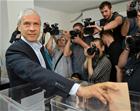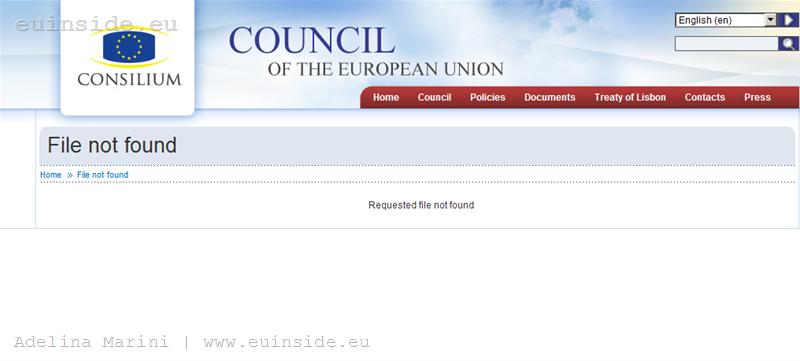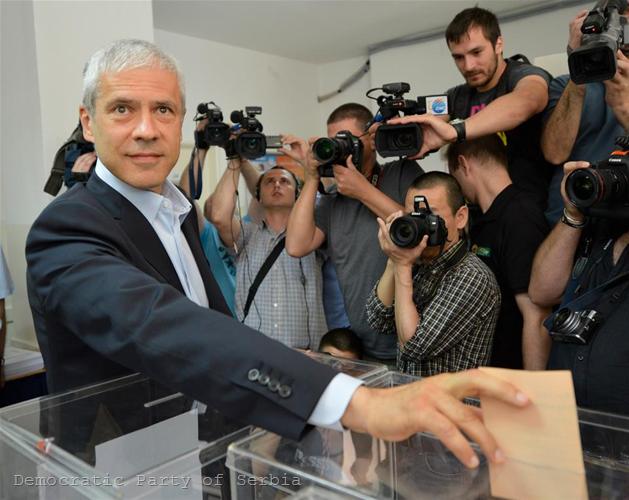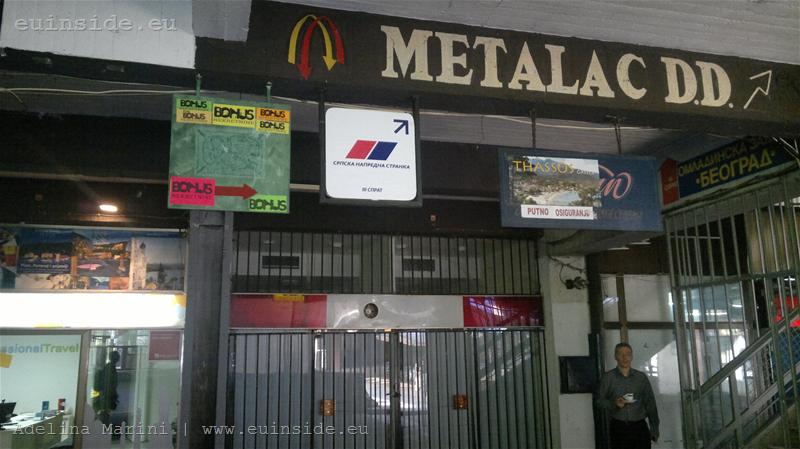In Serbia the Winner Is ...
Dessislava Dimitrova, May 7, 2012
 After a not that long election night in Belgrade, the questions remain and the political situation in the country does not seem that changed. As in all past elections since 2004, the big question again is who will be more convincing in the upcoming two weeks before the second round of the presidential elections - Boris Tadic or Tomislav Nikolic. Then come the questions will the president have a leading role in the next four years or the prime minster who, for now, is unknown; could the model president and prime minister to be from one and the same party be broken; will we witness a new coalition in power and what will the citizens of Serbia after all get after the elections?
After a not that long election night in Belgrade, the questions remain and the political situation in the country does not seem that changed. As in all past elections since 2004, the big question again is who will be more convincing in the upcoming two weeks before the second round of the presidential elections - Boris Tadic or Tomislav Nikolic. Then come the questions will the president have a leading role in the next four years or the prime minster who, for now, is unknown; could the model president and prime minister to be from one and the same party be broken; will we witness a new coalition in power and what will the citizens of Serbia after all get after the elections?
The results
According to the latest data of the Central Electoral Commission, the difference  between Boris Tadic and Tomislav Nikolic is less than one percentage point. Tadic got 24.81% of the ballots, while for Nikolic voted 24.71%. Third is Ivica Dacic with 15.76 per cent. The results from the parliamentary elections, however, give a little advance to the coalition around Nikolic's Progressive Party, which won 23.53% of the votes, while the Tadic-led coalition has 22.09%. For the coalition, led by Ivica Dacic voted 16.02 per cent.
between Boris Tadic and Tomislav Nikolic is less than one percentage point. Tadic got 24.81% of the ballots, while for Nikolic voted 24.71%. Third is Ivica Dacic with 15.76 per cent. The results from the parliamentary elections, however, give a little advance to the coalition around Nikolic's Progressive Party, which won 23.53% of the votes, while the Tadic-led coalition has 22.09%. For the coalition, led by Ivica Dacic voted 16.02 per cent.
The analysts
 According to local analysts, this year's elections have shown several things, namely: that the ruling parties have sustained a significant defeat - as the coalition around Tadic's democrats, so that around the Progressive Party of Nikolic. Of totally 4 million voters in the parliamentary elections last night, the two coalitions have taken jointly around 2 million for the votes, less have voted for the Progressive Party and the Radicals, from which it split some time ago, altogether.
According to local analysts, this year's elections have shown several things, namely: that the ruling parties have sustained a significant defeat - as the coalition around Tadic's democrats, so that around the Progressive Party of Nikolic. Of totally 4 million voters in the parliamentary elections last night, the two coalitions have taken jointly around 2 million for the votes, less have voted for the Progressive Party and the Radicals, from which it split some time ago, altogether.
Another conclusion is that the small parties have realised that they cannot jump over the 5% threshold to enter Parliament on their own, so Serbia will again have a coalition government. This is why the expectations of the analysts, after the preliminary results were announced, are that the current ruling coalition between democrats and socialists could stay in power with the support of smaller parties like the libdems or the United Regions.
The analysts' opinion is that the bigger the difference from the mandates of the  parties that came next to the main winners, the more votes will be transferred to the bigger parties. Whoever forms the new government, the tasks he will face remain the same and, according to experts, the first meeting of the new authority will be with representatives of the International Monetary Fund, because the economic situation in Serbia in the past months is deteriorating.
parties that came next to the main winners, the more votes will be transferred to the bigger parties. Whoever forms the new government, the tasks he will face remain the same and, according to experts, the first meeting of the new authority will be with representatives of the International Monetary Fund, because the economic situation in Serbia in the past months is deteriorating.
Besides, according to Sasa Jankovic, ombudsman of the Republic of Serbia and former journalist, it is very important the administration to be reformed and the current situation to be changed, where many people work for small wages and no one is demanding to them to do their job, as well as a real fight against corruption to take place, because, in his words, corruption undermines the budget and the citizens' dignity.
Most analysts share the opinion that in fact, if the future prime minister is to be an expert, this would not help much the country, so it would be better if he is a politician, who will guarantee the rule of law. According to Milan Jovanovic, a political analyst, at the moment the premier's seat is not very attractive for anybody of the candidates, as was the situation during the campaign and no one will rush to take it.
The candidates
And while the analysts refuse to forecast who the next prime minister will be, the socialist leader had no such hesitations:
"The Socialist Party has achieved its best result after 5th of October 2000. [...] Like I promised, I have shown that in Serbia there are not only Tadic and Nikolic but there is also a third Serbia, on behalf of whose people I was speaking. As of tomorrow [May 7] I am starting a campaign, which I will certainly win, because in Serbia nothing will be the same anymore, because we no longer have only 7.6%. May be it is uncertain who the next president will be, but it is known who will be a prime minister. The people are not surprised, the people anticipated, everything that I have I owe it to the people and I am grateful".
 Those were the words of the leader of the Serbian Socialist Party, Ivica Dacic, on election night. A confirmation of the socialists' self-confidence was also the fact that the most noisy celebration was organised precisely in the socialists headquarters, who marked the election victory with torches and brass orchestra.
Those were the words of the leader of the Serbian Socialist Party, Ivica Dacic, on election night. A confirmation of the socialists' self-confidence was also the fact that the most noisy celebration was organised precisely in the socialists headquarters, who marked the election victory with torches and brass orchestra.
Much more humble in the celebrations but not in terms of appearances were Tomislav Nikolic and Boris Tadic. In election night Nikolic thanked everyone, including himself, and announced that on the very first day after the elections he would be anticipating negotiations with other parties to form a government. "I was first in the first round three times, I was never convinced that I would win in the end. Now I'm convinced that I will win the second round", Nikolic said regarding the presidential elections.
The incumbent president, Boris Tadic, is also preparing for a third battle against Nikolic. "I have to prepare for the next round. Tomorrow I will immediately launch a campaign. My intentions are to win and we will win", were Tadic's words.
 | © euinside
| © euinside | © Democratic Party of Serbia
| © Democratic Party of Serbia | © euinside
| © euinside